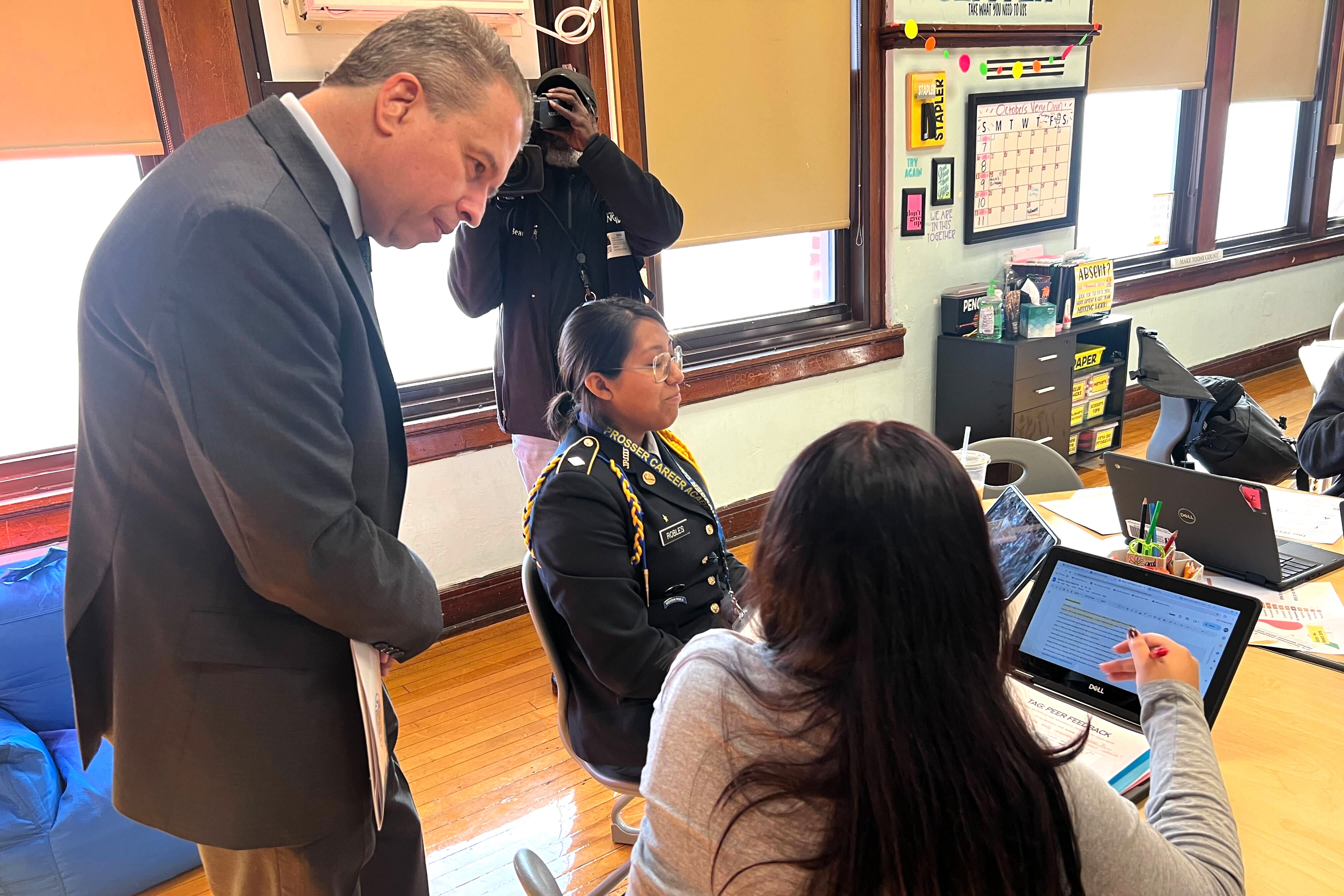Sign up for Chalkbeat Chicago’s free daily newsletter to keep up with the latest education news
Math and reading test scores ticked up for Chicago Public Schools students in grades 3-8, while high school graduation rates remained relatively flat, according to a trove of academic data released by the district on Thursday.
The data, which represents results from the end of last school year, shows that students are continuing to recover after the coronavirus pandemic set back academic progress.
Of Chicago students in third through eighth grade who took the Illinois Assessment of Readiness, or IAR, the state’s annual standardized test, about 30.5% met or exceeded the standard in reading and 18.3% met or exceeded the standard in math, the data shows.
Compared to 2022-23, reading scores grew by 4.6 percentage points and math scores by just .8 points.
The Illinois State Board of Education will release the state report card for the 2023-24 school year later this month with more statewide data regarding student test scores.
Chicago Public Schools officials touted the scores Thursday during an event at Prosser Career Academy High School, one day after CEO Pedro Martinez made a plea for more city funding amid a massive leadership shakeup at the district. One of his main arguments to alderpeople Wednesday was that additional financial support would help the district build on academic gains.
“I want to stress that these are not just numbers on a slide,” Martinez said at the Prosser event. “This data represents the hopes and dreams and achievements of thousands of students and families. They represent the hard work of our talented and dedicated school leaders, educators and staff, and they represent our broader commitment to ensuring high quality, rigorous education for every child of Chicago.”
Jen Johnson, deputy mayor of education, youth, and human services, credited the academic gains to the district’s investment in additional staff, which began growing after the teachers union reached a new contract agreement in 2019 and accelerated as the district spent federal COVID relief money.
“When you invest, you get the payoff,” Johnson said. “We’ve got to continue to demand what kids deserve.”
The lower growth in math could be for multiple reasons, including that schools have more robust resources for improving literacy, such as strong professional development, said Bogdana Chkoumbova, the district’s chief education officer.
Chkoumbova also said that a “significantly lower number of schools” offer high-quality mathematics curriculum, and fewer schools have adopted the district’s Skyline curriculum for math compared to reading. Also, academic interventionists and tutors at schools tend to focus more on literacy skills. The district is trying to beef up support and resources related to math instruction, she said.
“While we are seeing more growth in students participating in math tutoring, schools have prioritized tutoring in reading,” Chkoumbova said, adding it’s something the district is trying to shift more focus on.
A greater share of Black, Hispanic, and white students passed reading exams during spring 2024, while scores for Asian American students stayed relatively flat. Math scores ticked up for nearly every racial group except for Hispanic students, who scored the same as in spring 2023.
A study from Stanford and Harvard universities released in June found that Chicago students’ reading scores were recovering faster since the pandemic compared to other school districts. The report also noted that Illinois was leading the nation in reading growth between 2022 and 2023. Chicago Public Schools officials have repeatedly pointed to this study when requesting more education funding from the state of Illinois – and now, the city.
The IAR is administered every spring to Illinois students between third through eighth grade. Some school district officials have complained that schools usually receive state test scores in the next academic year when students have entered a new grade — often too late to intervene to support students.
Chicago Public Schools high school juniors’ SAT scores remained steady last year. About 22% of students met or exceeded state standards in reading – the same as spring 2023. In math, 18.6% of students met or exceeded the state standards, down from 19.1% in 2022-23 or a .5% decrease.
The average composite SAT score for spring 2024 was at 893 for 11th grade – about 17 points lower than in the 2022-23 school year when the district’s juniors scored an average of 910.
Spring 2024 was the last time Illinois high school juniors will take the SAT as the state’s graduation requirement. In May, the Illinois State Board of Education announced that it would switch to the ACT and awarded that company a $53 million contract over the next six years.
Chicago Public Schools high school graduation rates have been on an upward trend for the past decade. For the 2023-24 school year, 84.1% of high school seniors graduated, nearly identical to the 2022-23 school year, and up from 82.9% in 2022. That rate has steadily increased over the past two decades.
Martinez touted the district’s efforts to encourage more students to pursue early college credits and scholarships in order to make college more affordable and accessible.
College enrollment numbers are currently at 69.8% for Chicago graduates. According to the district, about 73% of students persist in college, or return to college for their second year.
Reema Amin is a reporter covering Chicago Public Schools. Contact Reema at ramin@chalkbeat.org.
Samantha Smylie is the state education reporter for Chalkbeat Chicago covering school districts across the state, legislation, special education and the state board of education. Contact Samantha at ssmylie@chalkbeat.org.






